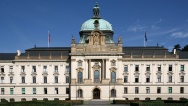Press Advisories
3. 3. 2009 12:16
J. M. Barroso: Thanks to the courage and perseverance of the peoples of Central and Eastern Europe
Prime Minister Topolánek,
Distinguished guests,
Ladies and gentlemen,
I'd like to start by saying thank you. To the Czech Presidency of course, for the privilege of speaking to you today - but just as importantly, to all the Member States of the European Union who joined in the enlargements of 2004 to 2007.
Thank you for your contribution in boosting the EU economy. Integration in the European Union has greatly improved living standards in your own countries. But by opening up new markets and investment opportunities, you have also stimulated growth and job creation in other Member States.
Thank you for strengthening the Single Market – the rock on which European integration is built. By dramatically increasing the size of that market, you have helped us all to reap greater benefits from it. You have enhanced the economic competitiveness and resilience of the EU as a whole.
Thank you for bolstering EU security, by extending Europe's zone of peace and stability, and taking the fight against organised crime and illegal immigration to the outer fringes of our continent. All Member States enjoy the benefits of your actions, while your experiences of reform provide an attractive model for many of our non-EU neighbours.
Thank you for increasing the EU's political and economic weight in the world. We are now in a much better position to take a leading role in the world economy and its governance, and in international negotiations in areas like trade, energy and climate change. Our improved geostrategic position also reinforces the transatlantic relationship and opens up new possibilities and perspectives in diplomatic relations with our neighbours and beyond.
Finally, thank you for bringing your ancient histories and cultures to the common European home we are building together. Your dynamism and diversity have made the EU immeasurably stronger and culturally richer.
All these benefits and more are highlighted in the European Commission's report "Five Years of an Enlarged EU". And Commissioner Almunía will present this report in more detail in a moment.
But I feel it is important today to highlight these facts up-front and clearly. Particularly as the consequences of the global financial and economic crisis work their way through our societies to devastating effect.
If we are to continue to realise the full potential of the European Union during these difficult times, a basic condition must be respected: that coherence and solidarity are not pushed to one side. On the contrary, they should be reinforced.
We need to help our citizens who are suffering the effects of this crisis. I know the Czech Presidency shares this concern. This is why Europe’s leaders met for an informal summit yesterday. We had an informal, yet comprehensive and open discussion that created a real meeting of minds, and a meeting of purpose. Prime Minister Topolánek and I have also called for an Employment Summit, to take place in May.
Now is the time for concrete measures, at the European level, to help those most in need. And Europe is delivering:
balance of payment support for Hungary and Latvia worth almost €10 billion, reflecting Member States' strong resolve to contain the effects of the crisis among fellow EU members;
frontloading of cohesion and structural funds releasing €11 billion - €7 billion of which for the new Member States.
a significant expansion in the European Investment Bank's activities, with an extra €15 billion per annum available in 2009 and 2010 – an increase of 30% above average lending. Convergence lending will increase by €2.5 billion per annum, with particular emphasis on the new Member States.
These are large sums of money, showing the EU is serious about solidarity. And the Commission will always be on the side of those who want to make solidarity a reality for our citizens.
More coherence is also necessary, if the EU is to project itself in the world effectively. We need a greater capacity to act together.
That is why the Lisbon Treaty – which was signed by all 27 Member States - is the treaty of enlargement. It will make the EU more efficient, and make further enlargements possible.
But institutions alone are not enough. As well as greater capacity to act, we also need a greater willingness to work together. We need to develop a real culture, a real mind-set, for European action.
The stakes are high, because as this crisis intensifies, our achievements together are increasingly coming under attack.
They are coming under attack from those who fear open societies and open markets.
And they are coming under attack from those who say widening the EU came at the expense of deepening.
Let me look at both of these briefly in turn.
There is no doubt that we are living through the greatest financial and economic crisis in living memory. The latest forecasts show that world trade and the world's GDP are both likely to contract this year – for the first time since 1947.
As businesses fail, and job losses mount, the siren voices of economic nationalism are making themselves heard again, as if we have learned nothing from the 1930s.
But there is one small problem for those hoping economic nationalism will protect them: it won't.
The Single Market on the other hand, with its free movement of goods, capital, people and services, has delivered plenty of growth and jobs. Steady integration into the Single Market through the accession process is estimated to have boosted growth in the new Member States by an additional 1.75% a year, for total growth of 5.5% a year from 2004 to 2008. A strong Single Market is the way out of this crisis.
Likewise labour mobility, far from 'stealing jobs', adds 0.3% to the EU's GDP in the medium term. Furthermore, this mobility has helped to meet labour market demands and reduce bottlenecks in the construction and services industry, for example. Perhaps those industries could spell out publicly what the consequences would be, if that labour mobility did not exist!
All this doesn't mean that no further improvements could be made, of course. In fact the crisis has exposed vulnerabilities, and underlined the fact that Member States from Central and Eastern Europe must make further efforts to safeguard their achievements.
In particular, it is crucial to continue with economic reforms. Only the right reforms can speed up entrance into the euro zone. And as the crisis is showing: the euro provides a safe harbour in stormy financial seas.
The EU's policy frameworks will help all Member States to face these challenges, and ensure a swift return to sustainable job creation and growth. Truly, this is a moment for reinforcing European unity. Together, we all win; divided, we all lose.
As for those who attack enlargement for preventing any deepening of European integration, I say: check your history books. Widening and deepening have always gone hand-in-hand.
The accession of the UK, Ireland and Denmark was an essential prerequisite to the Single Market;
Cohesion and regional policies are linked to the first two Mediterranean enlargements;
The euro owes its existence to the 'silent enlargement' of German reunification, followed by the Nordic and Austrian accessions; and
Since the 'Big Bang' enlargement, we have seen great strides in the field of justice and home affairs, and the creation of an integrated, European energy policy, that were unthinkable just 10 years ago.
The simple fact is, enlargement has always been a potent tool for spreading peace, democracy and prosperity to all corners of our continent. As a Portuguese, I know that. Many of you also know that, from more recent experience.
So enlargement should continue when appropriate, taking into consideration the lessons learned, and based on our renewed consensus on enlargement. In other words, the EU’s own capacity; the candidate countries ability to fulfil strict conditions; and better communication with our citizens.
Ladies and gentlemen,
We are in fact celebrating two anniversaries this year. Not just the 5th anniversary of the largest ever EU enlargement, but also the 20th anniversary of the fall of the Iron Curtain. And the two are inextricably linked.
Prior to 1989, the countries of Europe could not build a common home, despite our ancient, shared history. Prior to 1989, integration efforts were forced to accommodate artificial divides.
But thanks to the courage and perseverance of the peoples of Central and Eastern Europe, the shackles of Communist dictatorship were thrown off. And with that, the societies of those countries won a proud place in European history and a special role in healing Europe's fractured identity.
Five years after European reunification, the Czech Republic occupies the Presidency of the European Council – a challenging task which it is carrying out very effectively. This great responsibility is also a great privilege. In difficult times, Prime Minister Topolánek and I are working hand-in-hand (ruku v ruce ) to lead Europe in tackling the crisis.
So let me finish with a word of gratitude. I started my speech with a lot of thank yous, so it seems appropriate to finish with one as well:
Thank you for making the European Union truly European – and as great a Union as ever!
Thank you.






